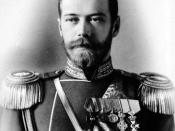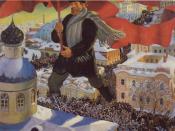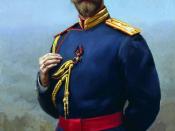The immediate cause of the collapse of the Tsarist government was the gigantic strain of World War I. The core cause was the backward economic condition of the country, which made it unable to sustain the war effort against powerful, industrialized Germany. Russian manpower was virtually inexhaustible. Russian industry, however, lacked the capacity to arm, equip, and supply the some 15 million men who were sent into the war. Factories were few and insufficiently productive, and the railroad network was insufficient. Repeated mobilizations, moreover, disrupted industrial and agricultural production. The food supply decreased, and the transportation system became disorganized. In the trenches, the soldiers went hungry and frequently lacked shoes or weapons, sometimes even weapons. Russian casualties were greater than those sustained by any army in any previous war. Behind the front, goods became scarce, prices skyrocketed, and by 1917 famine threatened the larger cities. Discontent became rife, and the morale of the army suffered, finally to be undermined by a succession of military defeats.
When the Duma, the lower house of the Russian parliament, protested against the inefficient conduct of the war and the uninformed policies of the imperial government, the Tsar Nicholas II and his ministers simply brushed it aside.
At first all parties except a small group supported the war. The government received much aid in the war effort from voluntary committees, including representatives of business and labour. The growing breakdown of supply, made worse by the almost complete isolation of Russia from its pre-war promotions, was felt especially in the major cities, which were flooded with refugees from the front. Despite an outward calm, many Duma leaders felt that Russia would soon be confronted with a new revolutionary crisis. By 1915 the liberal parties had formed a progressive alliance that gained a majority in the Duma.


